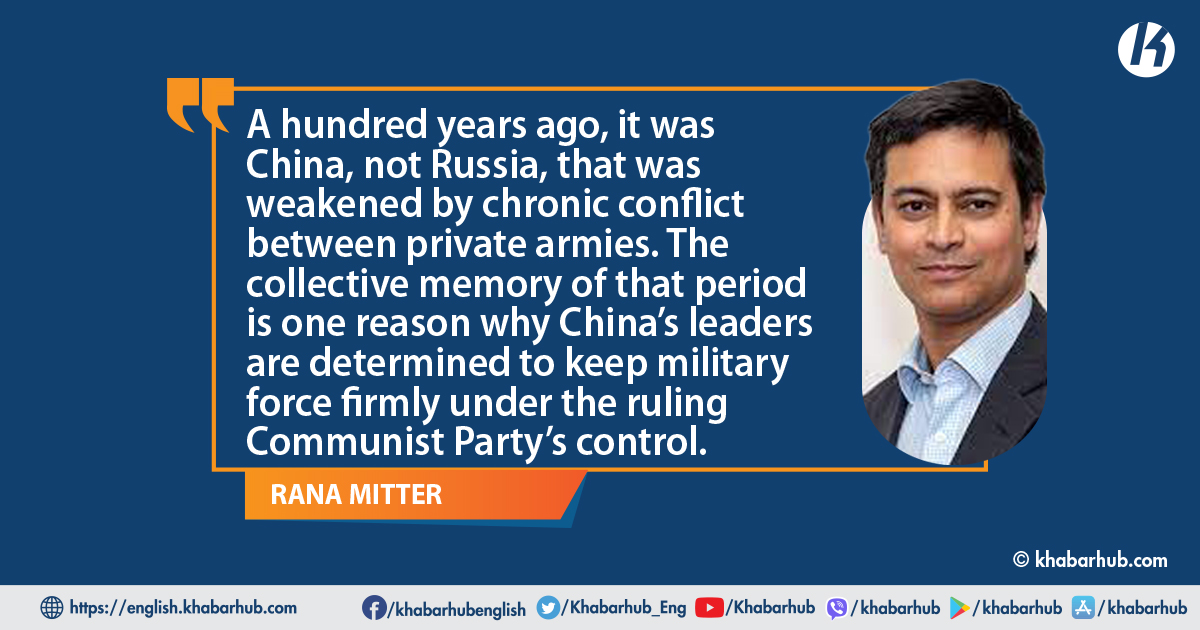The turmoil in Russia unleashed by Yevgeny Prigozhin’s Wagner Group has drawn rapt attention in capitals throughout the world, but probably nowhere more so than in Beijing.
The reason is not only that Russia is a trusted partner for China, but also that there are clear historical parallels between Russia this insurrectionary weekend and events a century ago that weakened China and left it vulnerable to invasion.
Today, Russia runs the risk of being split between four or five factions, each with its own army.
Aside from the Russian army and the Wagner Group, there are smaller forces under the control of the mayor of Moscow, the local militarist Ramzan Kadyrov in Chechnya, and a National Guard officially under President Vladimir Putin’s command but outside the chain of command of the Russian army. Various other armed forces protect the private business interests of a select group of Russian oligarchs.
A hundred years ago, it was China that was split between “warlords.” The collective memory of that period is one reason why China’s leaders are determined to keep military force firmly under the ruling Communist Party’s control.
The war also gave new strength to the insurgent Communist Party. Mao Zedong, one of its rising leaders, observed that “power grows out the barrel of a gun.” Therefore, he concluded, “the Party commands the gun, and the gun must never be allowed to command the Party.”
In 1911, an unplanned revolutionary alliance ousted China’s last emperor, a five-year-old boy, and declared the establishment of Asia’s first republic. Yet the new state was extremely unstable. Its constitutional president, Sun Yat-sen, lasted only a few weeks in office before being ousted by Yuan Shikai, a military leader with a massive army loyal to him, not the state.
China’s brief republican experiment was quickly overcome by a contest between military groups. Yuan died in 1916, shortly after trying to have himself declared a new emperor. For the next decade and a half, China was divided into regions ruled by local armies.
The term “warlord” (junfa) was used pejoratively to describe their commanders. Patriotic activists lamented that the danger confronting China had become twofold: imperialism from outside, warlordism from inside.
The effects of divided authority were obvious and grim. No one ruler could lay claim to all of China, and military leaders were constantly forming alliances that fell apart amid internecine fighting.
These warriors fought each other for one of the few reliable sources of tax income, the Maritime Customs Service, which was run by foreigners but provided revenue to whatever government happened to hold power in Beijing. Constitutional government became a dead letter.
This autumn will mark the centenary of the 1923 Chinese presidential election “won” by a warlord named Cao Kun, who bribed his way to power. To be fair, not all warlords were wholly venal: Yan Xishan of Shanxi province was known for his social reforms, such as prohibiting the practice of binding the feet of young girls.
For some in China, weak government was something of a blessing, because it meant that political dissidents, such as Communists, and writers in trouble with the authorities, could flee to another jurisdiction. Yet overall, the greatest suffering under the warlords was among the people who were unwilling victims or conscripts on the frontline of the constant battles among the various camps: the urban and rural population of China.
The origins of the problem lay half a century before the 1911 revolution. Between 1850 and 1864, a brutal civil war, the Taiping Rebellion, racked eastern China. The ruling Qing dynasty was trying to put down an insurgency led by a man convinced that he was Jesus’s younger brother.
For years, the imperial armies could not cope with the Taiping rebels. Eventually, the emperor had to allow provincial leaders to raise their own armies to fight them. This tactic succeeded, but at the price of devolving military power from the center to the provinces. As the dynasty weakened, the local military leaders gained strength. After the fall of the last emperor, they emerged as militarist “warlords.”
In 1928, Nationalist leader Chiang Kai-shek established a government that nominally unified China. Yet he spent much of the next ten years fighting rival military leaders as well as the Communists (forcing the latter on the famous Long March in 1934).
This week, as they follow coverage of Putin having to admit that a major Russian city was occupied by a rival army, the Chinese Politburo will have no doubts that their ruthlessness in military matters has paid off.
In 1937, war broke out with Japan, and in some cases, warlords cut their own deals with the invaders, seeking to preserve their regional power.
The war also gave new strength to the insurgent Communist Party. Mao Zedong, one of its rising leaders, observed that “power grows out the barrel of a gun.” Therefore, he concluded, “the Party commands the gun, and the gun must never be allowed to command the Party.”
Mao was as good as his word. Once the Communists had won the Civil War in 1949, Mao moved to crush all possible alternative sources of power in China. The People’s Liberation Army (PLA) was established as the Party’s army, not the national army. That is still its status today.
Even now, nearly 75 years after the People’s Republic was established, the thought of political upheaval backed by military force sends shivers through the Chinese leadership. It was widely rumored that Bo Xilai, the senior Party figure purged in 2012, had been in conversation with rogue army leaders in an attempt to seize power.
Soon after coming to power, President Xi Jinping made sure that the PLA was firmly under the Party’s control by purging numerous generals.
This week, as they follow coverage of Putin having to admit that a major Russian city was occupied by a rival army, the Chinese Politburo will have no doubts that their ruthlessness in military matters has paid off.
(Rana Mitter is Professor of the History and Politics of Modern China at the University of Oxford)
Copyright: Project Syndicate









Comment